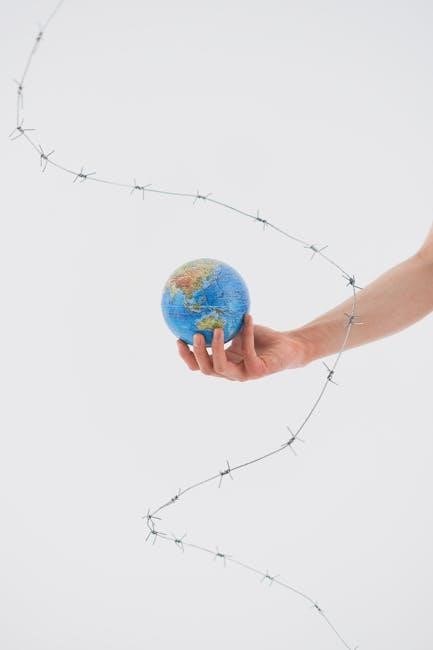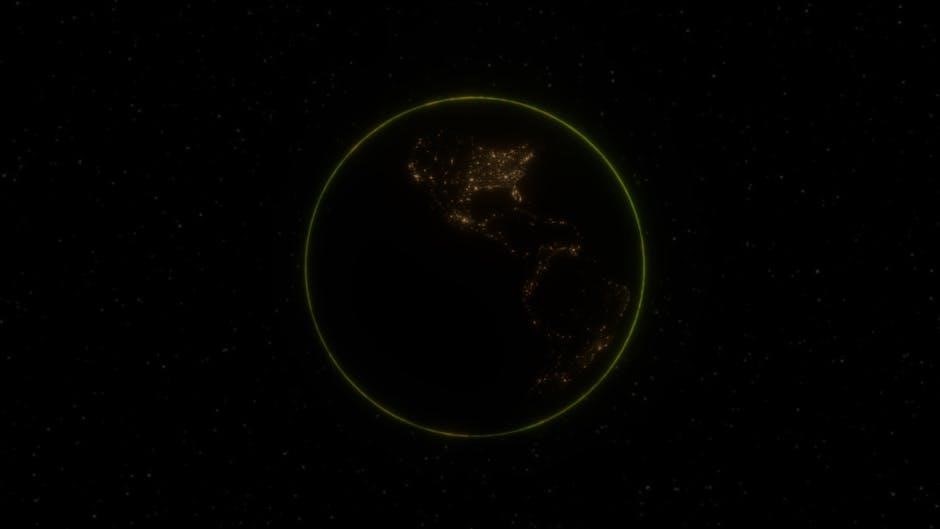
Geopolitics explores how political, economic, and cultural factors shape global power dynamics, offering insights into understanding and navigating the complexities of an ever-changing world order effectively.
Defining Geopolitics and Its Importance in Modern Context
Geopolitics is the study of how political, economic, and cultural factors interact with geography to shape global power dynamics and international relations. It examines how nations compete for resources, territory, and influence, while addressing the role of historical, cultural, and ideological differences in shaping conflicts and alliances. In today’s rapidly changing world, geopolitics is essential for understanding the shifting balance of power, the rise of new global actors, and the impact of regional instability. By analyzing these elements, geopolitics provides insights into predicting future conflicts, identifying opportunities for cooperation, and navigating the complexities of globalization. Its importance lies in its ability to explain how geography, resources, and ideologies influence state behavior, making it a critical tool for policymakers, scholars, and anyone seeking to comprehend the intricacies of global affairs.

The Shift in Global Power Dynamics
Significantly, the rise of China and Russia, alongside the Soviet Union’s collapse, reshapes global power distribution, fostering new alliances and intensifying tensions in international relations.
Rise of New Global Powers: China, Russia, and Emerging Economies
China and Russia have emerged as pivotal players in reshaping global geopolitics, challenging Western dominance through strategic alliances and economic initiatives. China’s Belt and Road Initiative exemplifies its expanding influence, while Russia assertively reclaims its role in international affairs. Emerging economies such as India, Brazil, and South Africa are also gaining prominence, diversifying global power centers. These nations leverage their resources, populations, and regional influence to negotiate favorable trade agreements and security partnerships. The rise of these powers accelerates the transition toward a multipolar world order, intensifying competition for resources and ideological supremacy. This shift underscores the importance of understanding these nations’ strategies and their implications for global stability and conflict.

The Impact of the Collapse of the Soviet Union on Global Geopolitics
The collapse of the Soviet Union in 1991 marked a seismic shift in global geopolitics, ending the Cold War and reshaping international relations. This event dissolved the bipolar world order, leaving the United States as the sole superpower while creating a power vacuum in regions like Eastern Europe and Central Asia. The disintegration led to the emergence of independent states, redrawing national borders and sparking ethnic and territorial conflicts. NATO’s expansion into former Soviet spheres of influence further altered security dynamics, while Russia struggled to redefine its global role. The collapse also accelerated the rise of China and other emerging economies, reshaping global power balances. This period underscored the fragility of political systems and the rapid transformation of geopolitical landscapes in response to major historical events.

Civilizations and World Order
Civilizations significantly shape global order by influencing cultural, political, and economic interactions, thereby defining international relations and geopolitical dynamics in a diverse and interconnected modern world.
The Role of Civilizations in Shaping Geopolitical Conflicts
Civilizations play a pivotal role in shaping geopolitical conflicts by fostering distinct identities, values, and interests that often clash across borders. The cultural and ideological differences between civilizations can escalate tensions, as seen in historical and modern disputes. For instance, the Arab Spring highlighted how civilizational fault lines can spark widespread instability. Similarly, ongoing tensions in Eastern Europe reflect deep-rooted civilizational divides. Civilizations influence how nations perceive threats and allies, shaping their foreign policies and alliances. Understanding these dynamics is crucial for addressing global conflicts effectively.
Cultural Differences and Their Influence on International Relations
Cultural differences significantly influence international relations by shaping how nations interact, negotiate, and perceive one another. Distinct value systems, traditions, and communication styles often lead to misunderstandings or conflicts. For example, varying attitudes toward hierarchy, time, and personal space can affect diplomatic negotiations. Historical and cultural contexts further complicate relations, as past grievances or differing interpretations of events can create tension. These differences also impact alliances, as nations with shared cultural values often collaborate more effectively. Additionally, cultural exchanges and soft power play a role in bridging gaps, fostering cooperation, and mitigating conflicts. Understanding and respecting cultural differences are essential for building trust and achieving mutually beneficial outcomes in international relations, particularly in a globalized and interconnected world;


Geopolitical Alignments and Conflict Resolution
Geopolitical alignments historically utilized strategies like dynastic marriages and territorial exchanges to resolve conflicts, while modern alliances rely on diplomacy and negotiations to maintain global stability and peace.
Historical Examples of Dynastic Marriages and Territorial Exchanges
Historically, dynastic marriages and territorial exchanges were pivotal in resolving geopolitical conflicts, ensuring stability, and forging alliances. For instance, the marriage of Catherine of Aragon to Arthur Tudor aimed to secure peace between Spain and England. Similarly, territorial exchanges, such as those following the Congress of Vienna, realigned borders to balance power and prevent future wars. These strategies often prioritized state interests over personal or cultural ties, reflecting the pragmatic nature of geopolitical decision-making. While such methods were effective in maintaining temporary peace, they sometimes led to long-term tensions, as minority groups or displaced populations faced marginalization. These historical practices highlight the complex interplay of diplomacy, power, and identity in shaping global conflicts and alliances. Modern geopolitics continues to draw lessons from these examples, blending historical strategies with contemporary diplomatic approaches to address evolving challenges.
Modern Alliances and Their Role in Global Stability
Modern alliances play a crucial role in maintaining global stability by fostering cooperation and deterrence among nations. Organizations like NATO and the European Union exemplify how collective security frameworks can address contemporary challenges. These alliances facilitate dialogue, economic integration, and military cooperation, reducing the likelihood of conflict. For instance, NATO’s expansion has aimed to stabilize post-Cold War Europe, while the Quad (India, Japan, Australia, and the US) addresses Indo-Pacific security concerns. Similarly, regional blocs like the African Union and ASEAN promote stability through multilateralism. These alliances also adapt to emerging threats, such as cybersecurity and climate change, demonstrating their evolving relevance. However, challenges like internal disagreements and shifting power dynamics test their effectiveness. Despite these issues, modern alliances remain vital in navigating geopolitical complexities and safeguarding global stability in an increasingly interconnected world.
Case Studies of Geopolitical Change
Case studies reveal how events like Brexit, China’s rise, and South China Sea tensions reshape global power dynamics and test international stability frameworks.
The Arab Spring and Its Aftermath in the Middle East
The Arab Spring, beginning in 2010, reshaped the Middle East’s geopolitical landscape through mass protests and regime changes in countries like Tunisia, Egypt, and Libya. This upheaval exposed deep societal divisions and sparked prolonged conflicts in Syria and Yemen. The power vacuum enabled the rise of non-state actors, such as ISIS, while regional powers like Iran and Turkey intensified their influence. The aftermath highlighted the fragility of authoritarian regimes and the challenges of transition to democracy. Additionally, the involvement of external powers, including the U.S., Russia, and Europe, further complicated the region’s stability. The Arab Spring’s legacy continues to influence global geopolitics, showcasing the interplay of internal unrest, external intervention, and the struggle for regional dominance. Its impact remains a critical case study in understanding modern geopolitical transformations and their far-reaching consequences.

The Ongoing Tensions in Eastern Europe and Their Global Implications
The ongoing tensions in Eastern Europe, particularly between Russia, Ukraine, and NATO member states, have significant implications for global geopolitics. These conflicts stem from historical grievances, territorial disputes, and competing ideological influences. The situation in Ukraine, exacerbated by Russia’s actions, has drawn international attention, highlighting the fragility of regional stability. The involvement of major powers like the U.S., China, and the EU has amplified the conflict’s global dimensions. Economic sanctions, energyDependencies, and military alliances have become central to the geopolitical strategies of all parties involved. This instability underscores the interconnectedness of modern global politics, where regional conflicts can rapidly escalate into broader international crises. The ongoing tensions in Eastern Europe serve as a stark reminder of the challenges of maintaining global stability in a multipolar world.
As the world continues to grapple with shifting power dynamics, cultural differences, and regional conflicts, geopolitics remains a critical lens for understanding global stability. The rise of new powers like China and Russia, alongside ongoing tensions in Eastern Europe, underscores the complexity of modern international relations. Historical events, such as the collapse of the Soviet Union, have reshaped global alliances and created new challenges. Moving forward, diplomacy, cooperation, and a deep understanding of cultural and political nuances will be essential in navigating the evolving geopolitical landscape. By analyzing these factors, we can better anticipate future conflicts and work toward sustainable solutions, ensuring a more stable and interconnected world.